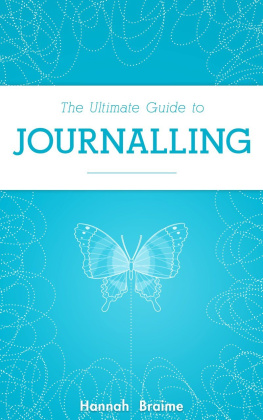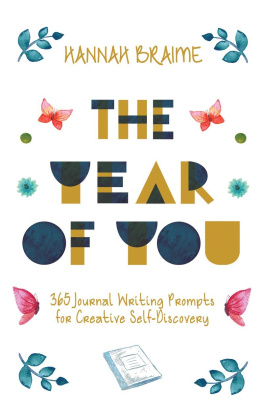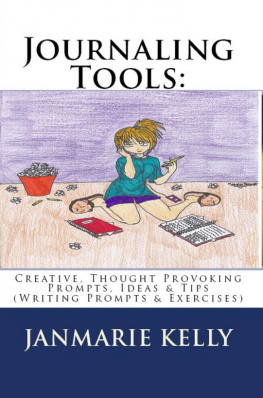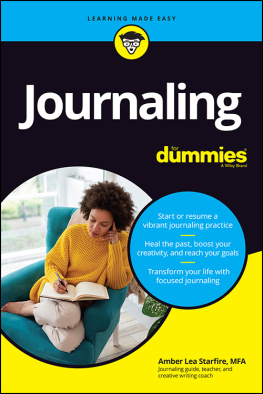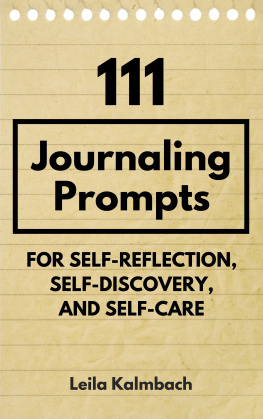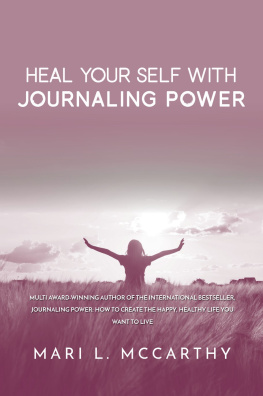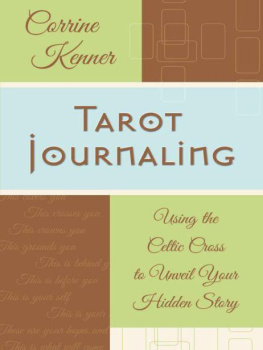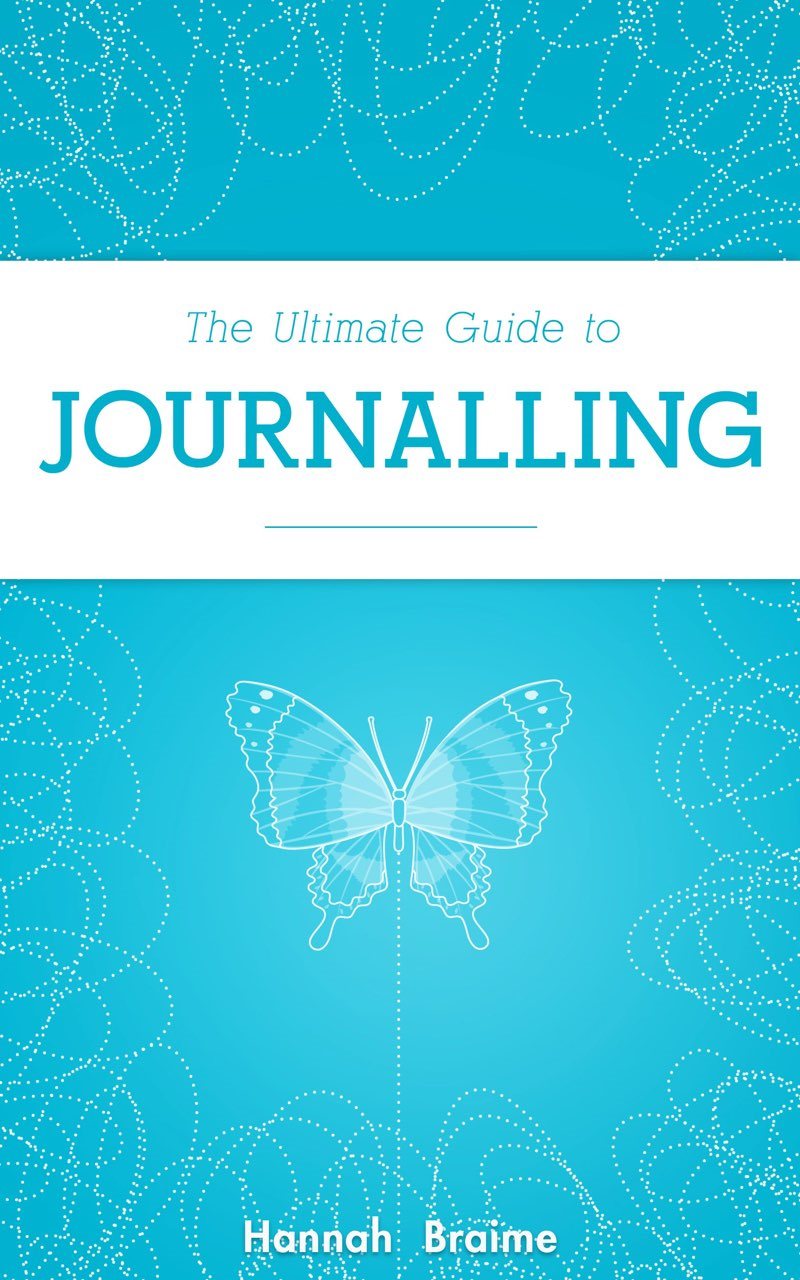Journal writing offers several wonderful opportunities. It offers him a chance to express the full and honest truth of his process with no degree of external judgmentand no pollution of an external reward. It allows him to expand and explore his consciousness in a safe and protected environment, and piece together the truths of his history at a pace entirely his own. No one from outside can push him, because his motivation, if it is to last over the long haul, must come from within .
Daniel Mackler, Toward Truth
T hank you for investing in this book. I hope it will inspire your creativity, help you get to know yourself on a deeper level, and be an enjoyable read. Whether you have journaled for years or have picked up this book out of curiosity, in the following pages youll find the tools and exercises you need to help you make the most out of pen and paper .
If I was going to label myself, it would be as an introvert, and Ive always felt more comfortable writing than speaking. Writing helps me get my thoughts in order; it helps me explore feelings and beliefs; and it opens up worlds for me that I wouldnt otherwise see. I kept my first proper diary when I was around nine or ten. Since then, I have spent a substantial amount of time journaling in one way or another with words, pictures, and even musical compositions .
My relationship with journaling has changed a lot. At times, I have hated everything I wrote; at others, its been a compulsion. Today I love journaling. I love experimenting with the way I journal, as well as exploring different methods of communicating with and expressing myself. Most of all, I love looking back and seeing how my journaling, my self-knowledge, and my thought patterns have evolved .
The Idea behind The Ultimate Guide to Journaling
I wrote this book because I wanted to create a single ultimate resource, containing all the tips, insights, and techniques that I have found helpful in my own journaling. Here my goal has been to bring practical information and emotional insight together in one place, so that you can find both suggestions for your journaling practice and ideas about how to use the fruits of your practice to gain greater self-awareness. Many books offer ideas to get you started with your journaling practice, but very few tell you how to make sense of what you discover .
On my own journey, I searched far and wide for a resource that explained the whole journaling process from start to finish, and that is what this book aims to do for you .
What Can Journaling Do for You?
Journaling puts you in touch with yourself. It helps you call on your inner strengths, lets you express the thoughts and feelings that you might not be able to express to anyone elseperhaps because you feel they are too personal and too exposing. Its a record of your life. It is accessible any time of day, and you are totally in control of how much or how little time you spend on it. As a bonus, the act of journaling itself doesnt cost a thing .
Journaling has a range of emotional and physical benefits. According to the Yale Medical Group, regular journaling can help manage stress and anxiety, and aid people who are coping with depressive feelings. In an article published by an online psychology network called Psych Central (The Health Benefits of Journaling, 2006), psychotherapist Maud Purcell suggested that the reason journaling can be so effective at helping us sort out our thoughts and feelings is because, when we write, our analytical, rational, and thinking left brain is busy, focused on the act of writing. This leaves our more intuitive, creative, and emotional right brain with space to make sense of our relationship with ourselves, other people, and to understand situations better. When the left brain is engaged, we take away the mental blocks this side of our brain erects to protect ourselves from the feelings or thoughts that challenge our self-beliefs or might be uncomfortable to explore .
Research at the University of Texas at Austin has shown that journaling can also have a positive influence on our physical well-being. Psychologist James W. Pennebaker (author of Writing to Heal) found that participants who engaged in a regular journaling practice experienced a strengthened immune system, as well as a reduction in physical symptoms caused by conditions like asthma and rheumatoid arthritis .
For me, I know that, without journaling, I would feel less than whole, because I would know less about myself .
Reading books, talking to other people, and similar activities are important and necessary to develop self-knowledge, but journaling is the most effective self-therapy tool Ive encountered. Although I used to appreciate my journal because it was always there for me, Ive come to realize I like it because it reminds me that I am always there for me .
You dont need to be a good writer and it doesnt matter if you dont consider yourself to be creative. All the tools you need to start exist inside you already. The ideas and suggestions in this book are just suggestions, and you can tailor them as you wish .
How to Use This Book
This book is designed to be flexible. You can read it from start to finish or use it as a quick-reference guide. The first section explains journaling as a practice, including what tools to use, how frequently to do it, and how to get yourself in the right headspace to begin. The second and third sections contain a series of suggestions for written and using art for journaling. Finally, the fourth section explains how to use your journaling for greater insight into your past, present, and future .
You can use this book for the thirty-eight journaling ideas presented herein alone. Each numbered suggestion has its own chapter in Parts 3 and 4, so you can dip in and out as you need .
Each journaling suggestions title summarizes the content and subject matter. When trying to choose one that feels right for you, try using the Contents page as a menu and start by exploring titles to which you feel drawn .
The ideas in this book arent a substitute for professional help. If you feel like youre struggling with difficult feelings or thoughts, or want some support and guidance as you go through the exercises in the following pages, consider getting in touch with a licensed therapist or coach .
Thats the skinny. I hope you enjoy reading and using this book as much as Ive enjoyed writing it. Before we move on, would you like a free video class on starting (or restarting) your journaling practice? If the answer is Yes! go to http://journaling.becomingwhoyouare.net/book and enter your email to access your free 10-step guide to starting a regular journaling practice. When you register, youll also get more free workbooks, video classes and more tools for personal growth in the Becoming Who You Are Library (I will never, ever share your email and you are free to unsubscribe at any time ).

